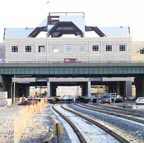Confirming reports from New Jersey Transit that The Secaucus Transfer Station is on schedule to open on its new September, 2003, deadline, William McCann, president of Allied Junction – the project’s commercial element – said the new date will not delay his project.
"The last word we got was that the station itself had been pushed back from the original projected opening of January, 2002, to September 2003," McCann said.
Four 40-story buildings, made up of hotel, retail and office space, will rise above the train station in 2003.
Rumors and a published report in the New York Times claimed that train terminal, which is designed to service midtown Manhattan, would be put on hold indefinitely due to lack of train cars to accommodate the additional passengers. While ridership has increased and is expected to increase as the New York financial district recovers from the Sept. 11 terrorist attack, the delays have been due to contract work, McCann said.
Terminal Construction, the firm hired to put up the new station and realign the tracks, has run into several problems. According to Mayor Dennis Elwell, alignment of the tracks – which would connect NJ Transit’s Main Line with an Amtrak line – has not yet started. One engineering firm, assisted by a team of 24 consultants, was retained for overall design of the project, and another engineering team consisting of eight consultants is used for construction management.
"We’ve been told that [track alignment] alone will take a year," Elwell said.
NJ Transit said delays have also been caused by limited tunnel access under the Hudson River, and that the Secaucus Transfer Station was designed to work in conjunction with PATH trains. With the disaster, PATH trains no longer run to Manhattan’s financial district.
NJ Transit is scheduled to install a new system to increase the number of trains to midtown Manhattan by March 2003, setting the stage for the train station’s opening.
The extra year and a half delay, however, will not affect other development projects slated for the area, according to McCann, especially not Allied Junction, the commercial element of the rail transfer station.
The Secaucus Transfer-Allied Junction Project is at the heart of the state’s Urban Core Program, a $2-billion package of 10 railroad projects intended to transform the state’s many lines into a coordinated network. A 300,000 square foot station will be built at the crossroads of Amtrak’s Northeast Corridor (NEC) and NJT commuter lines.
Secaucus Transfer began as a public-private partnership between NJT and Allied Junction Corp. originally had 28 acres along the New Jersey Turnpike for billboards, then realized the property’s strategic location had development potential. Work finally began on access roads and power relocations in 1995.
The station will allow passengers to transfer from the Main, Bergen, Pascack Valley and Port Jervis lines to the NEC and travel to Penn Station in midtown Manhattan. Kearny Connection and Secaucus Transfer Station are expected to increase ridership and the number of daily trains by more than 40 percent.
No delay for development
McCann assured that the commercial element would not be delayed despite the slight delay in the rail portion.
"We’re prepared to negotiate with major tenants," he said. "We are currently discussing options with several."
Once McCann has a tenant, he will take the project to the New Jersey Meadowlands Commission for its construction and implemental approval. The NJMC, a regulatory arm of the state of New Jersey, must review and approve all plans for development within the Meadowlands area.
"We could start construction in January or February and have everything ready when the train station opens," McCann said. "We’ve projected it will take 18 months to two years to complete."
McCann said that other projects connected to the train station will not be delayed either, such as the Turnpike interchange and the convention center.
McCann said the biggest issue for Allied now is signing a major tenant. Once that is in place, other aspects will follow.
The time frame favors Allied Junction, since office construction it will be in place in time to handle some of the overflow of tenants who had to leave Manhattan due to the Sept. 11 disaster.
"Jersey City has already filled up its office space," McCann said. "Now we’re the only game in town. We’re the only major construction project in the area with all our permits in place."
Once ready to construct, Allied will go up quickly, he said, because it will be using the train station as a foundation.
